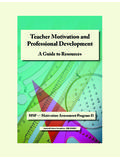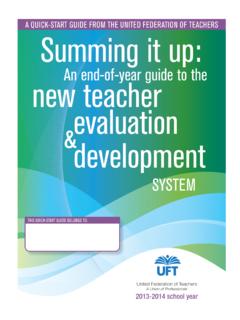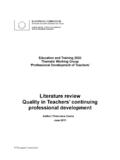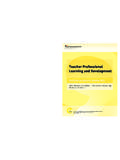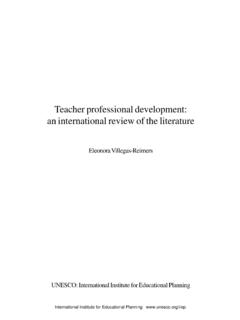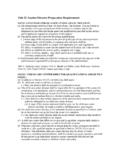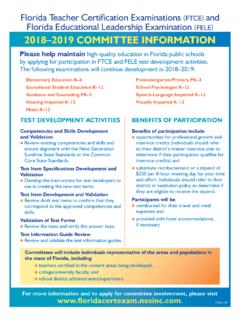Transcription of Teacher Motivation and Professional Development …
1 Teacher Motivation and Professional Development A Guide to Resources MSP Motivation Assessment Program II. National Science Foundation DUE 0928103. MSP-MAP II: A Guide to Resources 1. 2 MSP-MAP II: A Guide to Resources Teacher Motivation and Professional Development : A Guide to Resources Laura J. Schieb &. Stuart A. Karabenick Math and Science Partnership Motivation Assessment Program II. (MSP-MAP II). National Science Foundation, DUE 0928103. In addition to this document, a searchable database is available at: MSP-MAP II: A Guide to Resources 3. MSP-MAP II. Stuart A. Karabenick (PI). Combined Program in Education and Psychology University of Michigan AnneMarie Conley (Co-PI). Department of Education University of California Irvine Martin L.
2 Maehr (Co-PI). Combined Program in Education and Psychology University of Michigan Consultants: Deborah Ball, University of Michigan, USA Ruth Butler, Hebrew University, Israel Joe Krajcik, University of Michigan, USA . Helen Watt, Monash University, Australia Research Associates: Amanda Berhenke, University of Michigan . Colleen Kuusinen, University of Michigan Fani Lauermann, University of Michigan Kara Makara, University of Michigan Loren Marulis, University of Michigan Teya Rutherford, University of California Irvine Nayssan Safavian, University of California Irvine Nicholas Yoder, University of Michigan Research Assistance & Technical Support: Pamela MacInnis-Weir, University of Michigan Glen B.
3 Raulerson, University of Michigan . Laura J. Schieb, University of Michigan Please Cite As . Schieb, L. J., & Karabenick, S. A. (2011). Teacher Motivation and Professional Development : A Guide to Resources. Math and Science Partnership Motivation Assessment Program, University of Michigan, Ann Arbor, MI. 4 MSP-MAP II: A Guide to Resources Table of Contents Search Categories and Database Motivation and Teacher PD Resource Achievement and Other Classroom Grade Institution/School International Program Quality of Reform and School Student Student Subject Teacher Testing and General A Look References Appendix A: Resource Category Definitions and Search Appendix B: Resources and Category Search MSP-MAP II: A Guide to Resources 5.
4 Abstract Teacher Motivation and Professional Development : A Guide to Resources provides information on teach- er Motivation for those planning, conducting, and evaluating PD in math and science. Over 250. resources relevant to Teacher Motivation and PD were identified and categorized. Categories are described with representative citations, commentaries, and examples to facilitate the search for rel- evant information. General trends in the literature are noted, including the importance of Teacher self-efficacy, the need for collaboration, intrinsic rewards, Teacher autonomy, administrative support, and education policy. Given limitations in the existing literature, it was concluded that more research is needed to understand how reforms in curriculum and instruction affect Teacher Motivation for PD.
5 In addition to the document, a searchable database is available at 6 MSP-MAP II: A Guide to Resources Introduction Teacher Professional Development (PD) interventions are designed to increase Teacher content knowledge and pedagogi- cal content knowledge. There is considerable consensus (although not necessarily empirical support; see Weiss, 2009) for the features of PD programs that are necessary and sufficient for their success (Darling-Hammond et al., 2009; Guskey, 2003; Hassel, 1999; Hawley & Valli, 1998; Loucks-Horsley et al., 2003; National Commission on Teaching and America's Future, 1996; Weiss & Pasley, 2009). In addition to the focus on Teacher knowledge and practices, there are urgent calls to examine the role of Teacher Motivation in PD.
6 Goldsmith and Schifter (1997), for example, suggested that descriptions of Teacher Development need to add accounts of individual motivational and dispositional factors. Similarly, in his more contemporary review, Tittle (2006) concluded that while [t]here are references [in the literature] to Motivation and affective (or dispositional) characteristics as important to Teacher learning [f ]ew studies address these areas, areas that are likely to be important for assessments of long-term Professional learning and de- velopment (p. 976). Boyd et al. (2003) highlighted the critical role of Teacher Motivation in PD as one of their four key recommendations: A primary challenge for large-scale PD projects lies in attracting teachers and sustaining their involvement so that they can receive the full dose of PD (p.)
7 112). And yet, a recent work on PD in math and science (Weiss & Pasley, 2009) does not explicitly include Motivation . Motivational concerns, while often alluded to in passing ( , with regard to participation incentives or Teacher confidence), remain a critical yet understudied component of Teacher PD interventions. Here we focus specifically on teachers' Motivation to (a) participate in PD and (b) to apply the knowledge and skills acquired to their instructional practices. As stated in the study of Local Systemic Change, You have to make every effort to get the teachers there and once you get them there, you have to make sure you have something of high quality that will en- courage them to come back (Boyd et al.
8 , 2003, p. 47), which is particularly important for higher education faculty (Zhang et al., 2008). Even for teachers who participate, their degree of engagement can both vary and moderate whether they profit from that experience. PD can influence Motivation for teaching math and science in particular (Alexander, 2008;. Tittle, 2006) and in general for attempting new instructional practices ( , reform math and problem-based science) that incur costs and risks as well as benefits and challenges (De Corte, Greer, & Verschaffel, 1996; Gregoire, 2003; Hargreaves, 1998; Richardson & Placier, 2001; Smith, 2000). Fortunately, the recognized importance of Teacher Motivation in the PD process Motivational concerns, arises at a time of renewed interest in Teacher Motivation in general (Watt &.
9 While often alluded to in Richardson, 2008), thus providing expanded opportunity to apply contemporary Motivation theory and research to current and future PD interventions. These ap- a critical proaches include expectancy-value (Watt & Richardson, 2008), achievement goals (Butler & Shibaz, 2008), interest theories (Hidi & Renninger, 2006), self-deter- yet understudied mination theory (Assor, Kaplan, Feinberg, & Tal, 2009) and new ways to think component of Teacher about emotion and affect (Pekrun, Frenzel, Goetz, & Perry, 2007). Such concep- tual frameworks offer a range of constructs and assessment, which are particularly PD interventions. relevant for understanding the role of Motivation for PD in math and science.
10 To date, however, there has been no systematic focus on the factors that influence teachers' Motivation for participating in PD, their level of engagement during PD activities, and the degree to which teachers' Motivation and engagement in PD. influences their classroom instruction. Such research is essential to clarify the connection between Teacher and student learning (Kelleher, 2003), to identify the necessary components of comprehensive school reform, and ultimately to facili- tate student achievement (Blazer, 2005). The present document is designed to provide information for those planning, conducting and evaluating PD in math and science about the role of Motivation . Resources included ( , published journal articles, technical reports, conference pro- ceedings) are those at the intersection of Teacher Motivation and PD.
